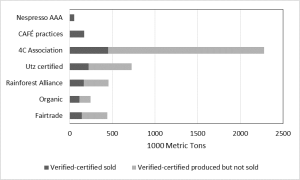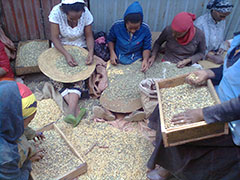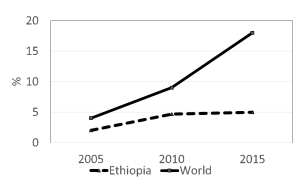Homepage content
On October 17, 2014, Bart Minten, Mekdim Dereje, Ermias Engida and Seneshaw Tamru delivered a presentation at the Ethiopian Development Research Institute (EDRI) in Addis Ababa on Voluntary Sustainability Standards (VSS) for coffee in Ethiopia.
There is a growing global emphasis on VSS practices in response to social and environmental pressure as well as trends of customers willing to pay higher prices for products that guarantee product origin, fair prices to producers, ethical standards of production/processing, environmental sustainability and safety and quality safeguards. As coffee is the most important export, comprising 25% of Ethiopia’s foreign exchange earnings, VSS is becoming a critical component in the global value chain for coffee. Yet, adoption rates by producers are low. Read more>>
Full page content
There is a growing global emphasis on Voluntary Sustainability Standards (VSS) practices in response to social and environmental pressure as well as trends of customers willing to pay higher prices for products that guarantee product origin, fair prices to producers, ethical standards of production/processing, environmental sustainability and safety and quality safeguards. As coffee is the most important export, comprising 25% of Ethiopia’s foreign exchange earnings, VSS are becoming a critical component in the global value chain for coffee. Yet, adoption rates by producers are low. Some of these challenges arise from the significant costs involved in obtaining VSS certification.
Figure 1 – VSS is rapidly taking off around the world. In Ethiopia, adoption is slow and low.
Source: Giovannucci et al. (2014) for world; Kodama (2009) and authors’ estimates for Ethiopia
Some examples of VSS in coffee include: Fair Trade, Organic, Rainforest Alliance, Utz Certified, 4C Association, CAFÉ practices and Nespresso AAA. It was estimated that, in 2013, 40% of global coffee production was produced under one of these VSS, but that only 15% was sold using VSS labels.

Figure 2 - Prevalence of Voluntary Sustainability Standards in the coffee sector (2013)
Source: Panhuysen and Pierrot (2014)
Although consumers—mostly in developed countries—are willing to pay significant premiums for such standards, it is not well understood how effective these incentives are being transmitted to producing countries.
The study of VSS in Ethiopia’s coffee sector found that the transmission of the export quality premiums to producers is as low as only one third of the premium being transmitted. Moreover, because quality premiums are small and production levels of the average coffee producers in these settings are low, even if the transmission were perfect, it would only lead to an increased income of 20 USD per year and, therefore, have little effect on the livelihoods of poor coffee farmers. Consequently, these findings cast doubt on the central tenet of the Fair Trade model and, more broadly, VSS.
View presentation on Slideshare.

